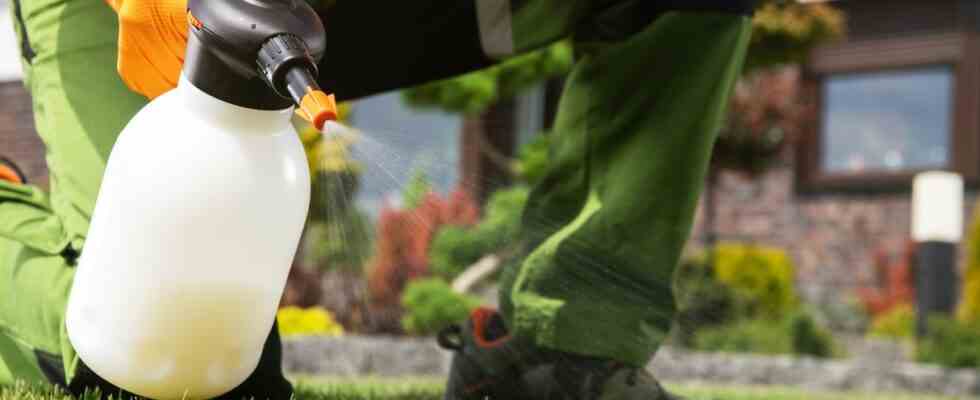How does white vinegar work against weeds?
The white vinegar that we find in our homes and that is available in supermarkets and specialized shops is generally composed of acetic acid diluted in pure water at a concentration of 8 to 10%. He acts as a contact herbicide by burning the leaves and stems and all the other aerial parts of the weeds with which it comes into contact. It therefore acts differently from synthetic chemical herbicides which penetrate the plant and have a systemic action which is the equivalent of poisoning.
It is therefore an ideal product that allows you to promote the growth of your future seedlings and plantations. without polluting the soil or having any harmful effects on animals and insects. Although natural and biodegradable, alcohol vinegar can have some harmful effects on plants, soils, animals and insects. You should therefore only use it as a weed killer only in limited quantities and spaced out over time.
If you mix alcohol vinegar with other products such as salt or dishwashing liquid, as explained later in this article, avoid sprinkling it on your squares and beds of vegetables or ornamental plants. These products can, in fact, sterilize the soil if used in large quantities.
In addition to its effectiveness and its absence of toxicity, spirit vinegar is a inexpensive alternative to other herbicides. It is, in fact, easy to obtain in large quantities at the price of a few tens of euro cents per litre.
Recipes for homemade weed killers using white vinegar
There are a multitude of grandmother’s recipes for making a natural, biodegradable and economical weed killer based on alcohol vinegar. Here is a selection of the most effective and simple recipes.
Weed killer with white vinegar and coarse salt
This is undoubtedly the oldest and most widespread recipe in France and elsewhere. To prepare it, mix in a large bucket 200 milliliters of white vinegar, 1 kilogram of coarse iodized salt and 5 liters of water. Stir vigorously and boil the mixture in a pot to dissolve the salt well. You can then use the resulting mixture with a spray bottle or garden sprayer to weed out.
Be aware that salt sprinkled in large quantities can sterilize the soil. Use this solution sparingly and, ideally, reserve its use with paved paths and terraces which are not intended for plantations.
the baking sodaless toxic to soils, can replace coarse salt in this recipe. Mix 500 grams of baking soda with 200 milliliters of white vinegar and 5 liters of water.
Water and white vinegar
This is another very popular recipe, but which is slightly less efficient than the previous one. Salt has, in fact, a herbicidal power, because it also burns the aerial parts of plants and also attacks their roots.
To prepare this weed killer, you just have to mix one part vinegar and one part water. Use the acetic acid solution like any weed killer spray. If after a few days you notice a lack of effectiveness and the weeds have not suffered any damage, repeat the operation by increasing the quantity of alcohol vinegar and decreasing that of water.
To make this solution even more efficient, you can add a small amount of black soap. This makes the solution more adherent to the leaves, which reinforces and prolongs its herbicidal action.
White vinegar and washing up liquid
The washing-up liquid allows the white vinegar to adhere better to weed leaves and to be less washable by rainwater. It also has an intrinsic herbicidal power.
To prepare this homemade weed killer, but less natural than the previous onesmix in a large bucket 3 liters of white vinegar, a teaspoon of washing-up liquidpreferably organic and natural and 100 grams of salt. Mix vigorously until the salt and dishwashing liquid dissolve and use the solution thus obtained on the invasive plants by spraying it with a spray bottle.
There too, avoid using this solution too intensively, because salt and washing-up liquid can be harmful to the floor. Just like our first recipe, reserve the use of this one for plots and corners on which you do not plan to plant or sow plants.
Some alternatives to spirit vinegar
Alcohol vinegar can be used, but sparingly and taking the precautions already mentioned in this article.
If you want to get rid of weeds competing with your tomato plants or ornamental plants, you can use even more natural and gentler alternatives.
Among the alternatives available to you are: the boiling water, the most natural weed killer available, but can only be used to prepare the ground and rid it of weeds before sowing or planting. To save water, use the cooking water for your pasta, vegetables or rice, while it is still boiling.
You can also use traditional recipes like nettle manure, corn flour, weeding and baking soda sprinkle or spray on weeds.

